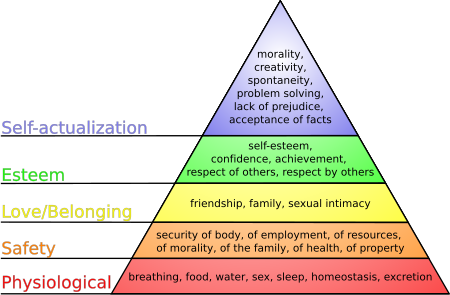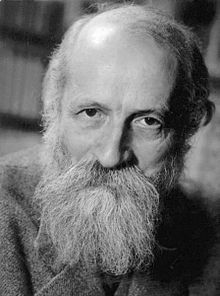
in a discussion with others around how to assist building civic capacity for civic engagement. One of our group members who works with communities in chronic poverty gave voice to the loss of empowerment members of that community feel. "They are just trying to survive", she noted. This gave rise to a comment regarding Maszlow's self-actualization pyramid

that explains that issues of survival come before other more ethereal questions. I left the meetings carrying that realization with me and pondering over how we might both move folks out of survival mode and into engagement with their neighbors.
Upon my return I was hunting down some references for a response I had made to a colleague regarding dealing with incivility in a community development approach. On the spur of the moment I decided to query a listserv with the National Council on Dialogue and Deliberation I am on for some suggestions.

The first response was to a lesser known book by Martin Buber, Between Man and Man. That title reminded me that Buber was among, if not The first to use the word Possibilitator.
That memory led me to reflect on a little known book that I read a few years back that just swallowed up my attention for a couple of weeks - Peter Westoby's and Gerard Dowling's Dialogical Community Development with Depth, Solidarity, and Hospitality. I found this book that a friend had sent my way on the shelf this morning and found that indeed I had really marked it up. I thought it had been a focus of one of my early Possibilitator blogs, but that proved to be a false memory. I do remember writing about it to others as I was making my way through it, so I thought perchance I had saved some of those writings, but alas, if so, it is well hidden.
The chapter I had marked up the most was one entitled Training for Transformation: The Possibilitators. Since I read this book in 2010 or 2011 and didn't start this blog until the end of 2012, it is pretty clear that this work, more than any other inserted the 'possibilitator' concept into my leaky brain. So this blog is a modest attempt to give the authors their due (although nothing I have written here or in earlier blogs should be attributed to them - except the few excerpted quotes below).
The brief note that I sent to a colleague that started me on this journey was:
Part of the incivility, I would suggest, is our growing tie to
winning and losing, whether in debates, elections, football, economics. It is
based on seeing ‘the other’ = the enemy, the opponent, other party… as
separate from us. Much as our destruction of our ecological integrity is the
result as seeing ourselves separate from nature.
This is reductio ad absurdum. It’s the system that encourages
freedom to trump commonwealth, that allow nation-states to ‘compete’ for
‘superiority’ in whatever arena of concern that is of the moment.
When we pull people out of those typical straitjackets and
provide a forum with ground rules that provide safety, people will likely be civil and possibilities will emerge if we’re not just simply focusing on ‘which’
of dueling dualities is the right one.
Here are a few of the relevant, and I feel, crucial points that Westoby and Dowling make.
Vulnerability is critical to re-imagining new ways of being, living, and working in our world; but debate will only lead people into defending known territory and old ways of imagining. (p.192)
What really inspires people are stories - stories of how other communities are tackling the same kinds of challenges they are experiencing. In this sense the learning space facilitates empowerment, not through depositing information and the use of content-oriented technologies, but through the exchange of inspirational stories. (p.201)
Stage One of the transformational learning process requires participants to recognize this: to recognize that as an individual "I do not really know the truth", "that my given reality is just one reality". It requires what Arjen Wals and Fanny Heymann (2004, p134ff) call 'frame awareness'. The shift begins when participants are invited to become aware of difference - often through simply listening to others. (P.204)
The first key step in moving towards action involves reclaiming the ability to wish. It is not so much that people have an inability to wish, but rather that they distrust or suppress their wishes. Deep down, many people desire a different kind of community, a different kind of relationship with their neighbors, a different kind of economic order. However many people also seem content with the world as it is, so it can become easy to simply distrust our desires.
At the heart of our proposition is the idea that if people do not want something, or do not trust their wanting, then they will go nowhere - more colloquially, will simply 'go with the flow'. Gerard remembers the axiom that expressed this for him: "Even a dead dog can swim with the current". Therefore at the initial stage of transformational training it is important to engage with people's stories in ways that re-awaken the imagination - particularly in enabling people to express their desire or wish for a new kind of world, challenging the 'given', or re-trusting their dreams and heartfelt desires. (p.207)
A better world is possible and we have only begun to explore the possibilities. These folks offer us some possible approaches to building a world where we see others as connected to, not separate from us.
as Jean Luc Picard might say, "Make it so".

No comments:
Post a Comment